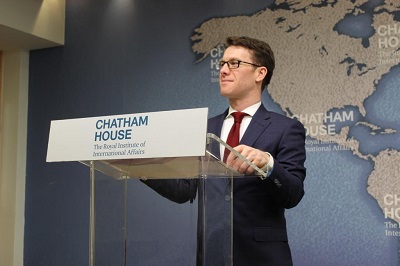Has COVID 19 undermined the rule of law? New research examines actions in the Western Balkans
 The coronavirus pandemic has presented populist governments with a unique opportunity to implement authoritarian measures and to limit public scrutiny of their decisions and policies, argues Dr Andi Hoxhaj of Warwick Law School in a new paper published in the European Journal of Comparative Law and Governance.
The coronavirus pandemic has presented populist governments with a unique opportunity to implement authoritarian measures and to limit public scrutiny of their decisions and policies, argues Dr Andi Hoxhaj of Warwick Law School in a new paper published in the European Journal of Comparative Law and Governance.
In the paper, Dr Hoxhaj and co-author Dr Fabian Zhilla examine Western Balkans governments’ approaches to introducing and enforcing covid-19 legal measures, and ask whether the coronavirus pandemic has exposed the weaknesses of existing constitutional checks and balances in the six Western Balkans states.
Dr Hoxhaj was invited to present his conclusions at the re:constitution Workshop, Constitutionalism and Covid-19: Broadening the Lens, held from 30 September to 1 October in Rome, Italy.
Explaining his findings, Dr Hoxhaj said: “The covid-19 pandemic crisis produced a golden opportunity for authoritarian forces to undermine the rule of law and the state of democracy in the Western Balkans.
“Leaders have certainly made the most of it – silencing the media, suspending courts, using the full power of public office in their electoral bids, suppressing the opposition’s ability to challenge the ruling parties, and restricting freedoms.
“Through these actions, authoritarian leaders have further captured state institutions, acquired more unaccounted powers, and severely restricted parliamentary oversight – and as a result, further eroded the already weak rule of law system in the Western Balkans.”
Hoxhaj and Zhilla divided the six Western Balkans governments into three categories to analyse how the covid-19 crisis was exploited to consolidate power. These are:
- semiautocratic regime: Albania, North Macedonia, Montenegro, and Serbia.
- volatile autocratic regime: Kosovo
- ethnic autocracy: Bosnia and Herzegovina
Measures adopted by the governments included announcing a state of emergency by decree rather than by passing emergency laws through Parliament, delaying elections, deploying the police to break up public gatherings, instructing the courts to prioritise covid-related trials, limiting opposition parties’ access to media and communications, arresting people protesting on non-covid issues for breaking coronavirus curfews, giving pre-election bribes disguised as emergency financial support, and in one case, police arresting an opposition politician on the pretext of breaking lockdown.
Dr Hoxhaj added: “Our conclusion from the individual country studies is that Western Balkans governance during covid-19 not only resulted in the expansion of an authoritarian approach, but went further, by exploiting the pandemic as an opportunity to advance political agendas away from public scrutiny”.
The paper highlights that emergency laws can be seen as an indicator of the rise of totalitarian behaviour of the leadership in emerging democracies: a legalised vacuum of checks and balance is quickly exploited by political elite to extend the state capture. In this context this paper draws attention to further research on situation like pandemics where the mushrooming of emergency laws may be viewed as a characteristic of autocratic governance.
Dr Zhilla commented: “Most of the emergency laws and measures were brought into force through decrees and announcements from government leaders, bypassing the parliamentary procedures, consultations and scrutiny from the media, civil society, academia and the courts which are the hallmarks of liberal democracy. That this happened in plain sight is of great concern”.
Dr Hoxhaj and Dr Zhilla urge the EU to make greater effort through its conditionality instruments to help empower civil society, media and other non-state actors to transform the Western Balkans’s stabiliocracies and reaffirm the rule of law.
- The paper is one of the outcomes from the research network established by Dr Hoxhaj as part of his British Academy Rising Star Award, following on his previous publication “The EU Rule of Law Initiative Towards the Western Balkans”, published in the Hague Journal on the Rule of Law: https://doi.org/10.1007/s40803-020-00148-w
- "The Impact of Covid-19 Measures on the Rule of Law in the Western Balkans and the Increase of Authoritarianism”, is published in the European Journal of Comparative Law and Governance: https://doi.org/10.1163/22134514-bja10024
- Photo - Dr Hoxhaj pictured hosting a research event at Chatham House based on his British Academy Rising Star Award on Challenges to the Rule of Law in the Western Balkans
4 October 2021
CONTACT
Sheila Kiggins
Media Relations Manager
Faculty of Social Science
07876 218166
s.kiggins@warwick.ac.uk
